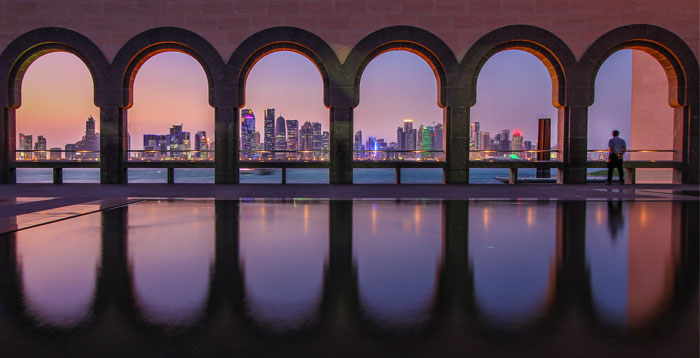Rising From Sand and Sea
In the 1970s, the Qatari capital of Doha was almost as flat as a pancake – a handful of multistorey buildings poked over the horizon and there was little of note in terms of landmarks. In the last few years, the landscape has transformed beyond recognition, dominated by high-tech, architecturally brilliant skyscrapers. The skyline continues to evolve and plans are in place for numerous supertall skyscrapers, stadiums and leisure facilities.
Qatar is determined to push ahead with growth, regardless of its current status at the top. A government backed plan – Qatar Vision 2030 – aims to stabilise the country’s massive short-term growth into a long-term, diversified financial plan. Part of the plan is investment in small and medium businesses with growth potential. There are several priority industries targeted, including tourism, education and health care. Growth plans also include nurturing the chemical, metallurgy, plastic and high-tech sectors, to reduce dependency on a handful of (ultimately finite) natural resources.
By creating more jobs and diversifying the sectors it participates in, Qatar secures a future. And that future is one of continued growth. The demand for workspaces, hotels, offices, laboratories and factories means that Doha’s skyline will never settle – the shapeshifting city isn’t ready to stop growing yet.
Qatar World Cup, 2022
The Qatar World Cup in 2022 is going to be a challenge to pull off. Qatar is hot; and that’s something of an understatement. Daytime temperatures in summer have been known to rise to over 50°C. During the summer, work halts from 11:30am to three in the afternoon to protect workers from the blistering midday sun.
Surface temperatures during this time of day are hot enough to bake cookies in a car. And while cookie baking weather sounds like fun, it’s not quite ideal for a football tournament. Little details like searing heat and formidable natural forces haven’t stopped Qatar before though, and now the country’s leading young minds, engineers and designers are inventing ways to artificially cool each stadium, to keep the beautiful game beautiful.
The 12 proposed stadia are grand in their design and ambition, and not just for their groundbreaking cooling technology – they’re beautiful monuments to the world’s favourite sport. Each stadium will be like an Olympic village; a destination for a day out and a world-class match venue.


